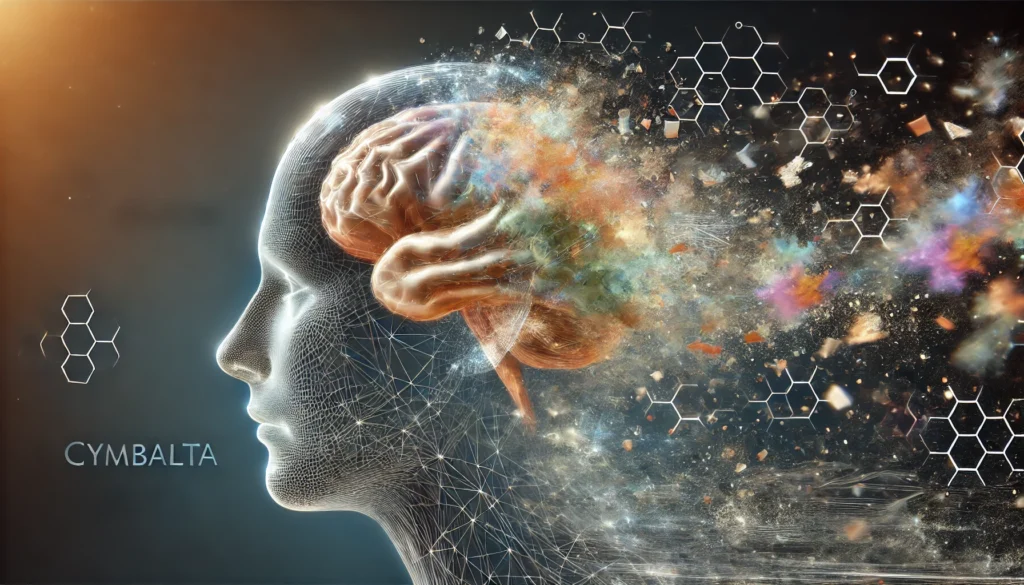In this article, we’ll delve into the potential link between Cymbalta and dementia, examining scientific evidence, side effects, and what this means for users of the medication. Our goal is to present this complex topic in an accessible manner, providing you with a comprehensive understanding of the current state of research.
You may also like: Understanding the Science Behind Lost Memory
Understanding Cymbalta and Its Uses
What Is Cymbalta?
Cymbalta, or duloxetine, is a prescription medication primarily used to treat major depressive disorder, generalized anxiety disorder, fibromyalgia, and neuropathic pain. As an SNRI, it works by increasing the levels of serotonin and norepinephrine, neurotransmitters associated with mood regulation and pain perception, in the brain. These neurotransmitters play a crucial role in maintaining emotional balance and mitigating pain signals, making Cymbalta a versatile medication for various psychological and physical health issues.
Duloxetine is often prescribed when other antidepressants have not provided adequate relief. Its dual action on serotonin and norepinephrine makes it particularly effective for individuals experiencing a combination of mental health and pain-related symptoms. The drug’s mechanism is believed to enhance communication between nerve cells, potentially improving mood and reducing pain perception.
Understanding the pharmacological action of Cymbalta is critical for both patients and healthcare providers. It helps in setting realistic expectations about the medication’s benefits and potential side effects. This understanding also aids in monitoring treatment efficacy and making necessary adjustments to therapy plans.
Common Side Effects of Cymbalta
As with any medication, Cymbalta is not without its side effects. Commonly reported side effects include nausea, dry mouth, drowsiness, dizziness, and fatigue. While these may be manageable for most users, some individuals may experience more severe reactions. Understanding these side effects is essential for patients to manage their treatment experience effectively.
In some cases, patients might experience gastrointestinal disturbances, such as constipation or diarrhea, which could affect their quality of life. It’s important for patients to communicate any side effects to their healthcare provider, as adjustments in dosage or medication type might be necessary.
Severe side effects, though less common, can include liver damage, serotonin syndrome, or an increase in blood pressure. Monitoring by healthcare professionals is crucial to prevent and address these potential issues promptly. Regular follow-ups with a healthcare provider can ensure that any adverse effects are caught early and managed appropriately.
Off-Label Uses of Cymbalta
Beyond its primary uses, Cymbalta is sometimes prescribed for conditions not explicitly approved by regulatory bodies, known as off-label uses. These may include treating stress urinary incontinence or chronic musculoskeletal pain. Exploring these uses opens up discussions about the versatility and adaptability of Cymbalta in treating diverse conditions.
Off-label prescriptions are based on clinical judgment and emerging research indicating potential benefits. Such prescriptions require careful consideration of the risk-benefit ratio and thorough patient education to ensure informed consent. Patients should have open discussions with their healthcare providers about the potential benefits and risks of off-label use.
The exploration of off-label uses underscores the importance of ongoing research and clinical trials. These studies help to expand the understanding of Cymbalta’s full therapeutic potential and guide safe and effective use across various patient populations.
Investigating the Potential Link to Dementia
Does Duloxetine Cause Dementia?
The question of whether duloxetine, the active ingredient in Cymbalta, causes dementia is a matter of ongoing research and debate. At present, there is limited direct evidence linking Cymbalta to dementia. However, researchers are exploring the broader potential cognitive impacts of antidepressants, especially in long-term use scenarios. Understanding the nuances of these studies is crucial for interpreting their findings accurately.
Research into the cognitive effects of duloxetine involves examining its impact on brain chemistry and structure. Some scientists hypothesize that changes in neurotransmitter levels might influence cognitive function over time. While these hypotheses are intriguing, they require substantial empirical evidence to draw definitive conclusions.
The debate over duloxetine and dementia also highlights the challenges in distinguishing between correlation and causation. Cognitive decline could be influenced by numerous factors, including pre-existing conditions, lifestyle, and concurrent medication use. Comprehensive studies are needed to isolate the specific effects of duloxetine from these confounding variables.
Scientific Studies and Findings
A number of studies have examined the long-term effects of antidepressants on cognitive function, but findings remain inconclusive. Some research suggests that certain antidepressants may have neuroprotective effects, potentially reducing the risk of dementia. Conversely, other studies indicate that long-term use of antidepressants may be associated with cognitive decline in some individuals. This dichotomy presents a complex landscape for researchers and healthcare providers to navigate.
For instance, a study published in the “Journal of Clinical Psychiatry” highlighted that while antidepressants, including SNRIs like Cymbalta, could potentially influence cognitive processes, there is insufficient evidence to definitively link them to dementia. It’s crucial to consider that individual responses can vary significantly based on genetic, health, and lifestyle factors. These variations underscore the need for personalized approaches to treatment and monitoring.
Another study, focusing on elderly populations, examined the potential cognitive effects of long-term antidepressant use. It found that while some individuals experienced cognitive decline, others showed no significant changes in cognitive function. This variability suggests that factors such as age, baseline cognitive status, and comorbidities may play a significant role in determining outcomes.

Neurotransmitter Imbalance and Cognitive Function
Investigations into the relationship between neurotransmitter imbalance and cognitive function continue to gain momentum. Serotonin and norepinephrine, targeted by Cymbalta, are not only pivotal for mood regulation but also for cognitive processes such as memory and attention. Researchers are keenly interested in how alterations in these neurotransmitters might influence cognitive health over time.
Neuroimaging studies have begun to explore how long-term use of SNRIs might affect brain regions involved in cognition. Preliminary findings suggest changes in brain connectivity, but their implications for cognitive function remain unclear. These studies represent a critical step in understanding the potential cognitive impacts of antidepressant use.
Understanding the role of neurotransmitters in cognitive health could pave the way for more targeted interventions. By identifying the specific pathways through which medications like Cymbalta affect the brain, researchers hope to develop strategies that optimize mental health benefits while minimizing cognitive risks.
Historical Context and Current Trends
Evolution of Antidepressant Use
Antidepressants have evolved considerably since their introduction in the mid-20th century. Over the decades, they have become a cornerstone in the treatment of mental health disorders. The increasing prevalence of mental health diagnoses has led to a corresponding rise in antidepressant prescriptions, prompting further investigation into their long-term effects. This historical evolution reflects broader changes in societal attitudes toward mental health and pharmacotherapy.
Early antidepressants, such as tricyclics and monoamine oxidase inhibitors, laid the groundwork for modern treatments but were often associated with numerous side effects. The development of selective serotonin reuptake inhibitors (SSRIs) and SNRIs like Cymbalta marked significant advancements, offering more targeted and tolerable options for patients.
The growing understanding of the biological basis of mental health disorders has also driven the evolution of antidepressant use. Research into genetic and environmental factors influencing mental health has spurred the development of personalized medicine approaches, aiming to tailor treatments to individual needs.
Current Research Directions
Presently, research is focused on unraveling the complex interplay between antidepressant use and cognitive health. Scientists are employing advanced imaging techniques and genetic studies to better understand how medications like Cymbalta affect brain structure and function over time. These efforts aim to provide clearer insights into any potential links to dementia.
Longitudinal studies tracking patients over extended periods are crucial for capturing the long-term cognitive effects of antidepressants. These studies help in identifying trends and potential risk factors associated with cognitive decline. By following diverse populations, researchers hope to account for variations in genetic makeup, lifestyle, and other factors influencing cognitive health.
Innovations in neuroimaging and biomarker research are also shaping current investigative directions. Techniques such as functional MRI and PET scans allow for detailed visualization of brain activity and structural changes. These tools are invaluable in assessing the impact of medications on the brain and identifying early signs of cognitive impairment.
Global Perspectives on Antidepressant Use
Antidepressant use varies significantly across different regions and cultures, reflecting diverse healthcare practices and societal attitudes toward mental health. Understanding these global perspectives provides valuable context for interpreting research findings and developing culturally sensitive treatment approaches.
In some countries, antidepressant use is more prevalent due to greater awareness and acceptance of mental health issues. In contrast, other regions may rely more on traditional or alternative therapies, highlighting the importance of considering cultural factors in treatment planning.
Global collaboration in research efforts is essential to gather comprehensive data on the effects of antidepressants like Cymbalta. By incorporating diverse populations and healthcare systems, researchers can gain a more nuanced understanding of the medication’s impact on cognitive health.
Practical Advice and Considerations
Discussing Concerns with Healthcare Providers
If you’re currently taking Cymbalta or considering its use, it’s essential to have an open dialogue with your healthcare provider. Discuss any concerns you may have about cognitive health and dementia, and explore alternative treatment options if necessary. Your healthcare provider can help tailor a treatment plan that addresses both your mental health needs and any cognitive concerns. This collaborative approach ensures that treatment decisions are informed and patient-centered.
Effective communication with healthcare providers involves sharing detailed information about your medical history, current symptoms, and treatment goals. This transparency enables providers to make informed decisions about your care and adjust treatment plans as needed. Regular check-ins and follow-up appointments are crucial for monitoring your progress and addressing any emerging concerns.
Patients should also feel empowered to ask questions and seek clarification about their treatment options. Understanding the potential benefits and risks of Cymbalta can help you make informed decisions about your health. If cognitive health is a primary concern, your provider may recommend cognitive assessments or adjustments to your treatment plan to mitigate potential risks.
Monitoring Cognitive Health
Regardless of medication use, monitoring your cognitive health is vital. Engage in activities that promote brain health, such as regular exercise, a balanced diet, mental stimulation, and social engagement. These lifestyle factors can play a significant role in maintaining cognitive function and reducing the risk of dementia.
Incorporating cognitive exercises, such as puzzles or memory games, into your routine can help enhance mental agility and resilience. These activities stimulate neural pathways and promote brain plasticity, potentially offsetting cognitive decline. Social interactions and maintaining an active social life are equally important, as they provide mental stimulation and emotional support.
Diet and nutrition also play a critical role in cognitive health. Consuming a diet rich in antioxidants, omega-3 fatty acids, and other brain-boosting nutrients can support cognitive function. Consulting with a nutritionist or healthcare provider can help tailor dietary choices to your specific needs and health goals.

Seeking Support and Resources
Navigating concerns about cognitive health and medication use can be challenging. Seeking support from mental health professionals, support groups, or community resources can provide valuable guidance and reassurance. These resources offer opportunities to connect with others facing similar challenges and access information that can aid in decision-making.
Mental health professionals, such as therapists or counselors, can provide additional support in managing mental health conditions and addressing cognitive concerns. They can offer coping strategies, therapeutic interventions, and emotional support to help you navigate treatment challenges.
Support groups and community resources offer a sense of belonging and shared experience. Engaging with others who understand your journey can provide emotional comfort and practical advice. Online forums and local support groups can be valuable sources of information and encouragement.
Future Implications and Research Needs
The Need for Continued Investigation
The potential link between Cymbalta and dementia underscores the need for continued research into the long-term effects of antidepressants on cognitive health. Large-scale, longitudinal studies are essential to unravel the complexities of this relationship and to provide clearer guidance for healthcare providers and patients alike. These studies can help bridge existing knowledge gaps and inform clinical practice.
Future research should focus on identifying specific populations at risk for cognitive decline associated with antidepressant use. Understanding genetic, environmental, and lifestyle factors that contribute to these risks can guide personalized treatment strategies. This research could lead to the development of targeted interventions that optimize mental health outcomes while minimizing cognitive risks.
Collaboration across disciplines and institutions is crucial for advancing research efforts. By pooling resources and expertise, researchers can conduct more comprehensive studies and generate robust evidence to guide clinical decision-making. These collaborative efforts can ultimately contribute to improved mental health care and patient outcomes.
Implications for Antidepressant Use
As research advances, it may inform future guidelines for antidepressant use, particularly in populations at risk for cognitive decline. Understanding the balance between mental health benefits and potential cognitive risks is crucial in optimizing treatment strategies. These insights can guide healthcare providers in making informed decisions about medication choices and treatment durations.
Emerging evidence may lead to the development of new antidepressant formulations with enhanced safety profiles. Innovations in drug design could focus on minimizing cognitive side effects while maintaining therapeutic efficacy. These advancements have the potential to revolutionize mental health treatment and improve patient quality of life.
Policy makers and healthcare organizations may also play a role in shaping future antidepressant use. By supporting research initiatives and implementing evidence-based guidelines, they can contribute to safe and effective mental health care. Public health campaigns and educational efforts can raise awareness about the importance of monitoring cognitive health and making informed treatment decisions.
Expanding Awareness and Education
Raising awareness about the potential cognitive effects of antidepressants like Cymbalta is essential for informed decision-making. Educational initiatives targeting healthcare providers, patients, and the general public can promote understanding and encourage proactive management of cognitive health. These efforts can empower individuals to make informed choices about their mental health care.
Healthcare providers play a critical role in disseminating information and educating patients about the benefits and risks of antidepressant use. By providing clear, evidence-based information, providers can facilitate informed discussions and support patient autonomy. Continuing education programs and professional development opportunities can enhance provider knowledge and skills in this area.
Public awareness campaigns can help destigmatize mental health treatment and encourage individuals to seek help when needed. These campaigns can highlight the importance of cognitive health monitoring and promote lifestyle strategies that support brain health. By fostering a culture of openness and understanding, these initiatives can contribute to improved mental health outcomes.

Conclusion
While the current evidence does not definitively link Cymbalta to dementia, it highlights the importance of ongoing research and informed decision-making in antidepressant use. By staying informed and engaging in open conversations with healthcare providers, individuals can make choices that best support their overall health and well-being.
In the ever-evolving landscape of mental health treatment, maintaining a holistic perspective that considers both the benefits and potential risks of medications like Cymbalta is key to achieving optimal outcomes. By prioritizing patient education, research, and collaboration, the healthcare community can continue to improve mental health care and support individuals on their journey to well-being.
Further Reading:
Duloxetine may help elderly with depression and cognitive impairment
Antidepressants and Dementia: Is There a Link?
Important Note: The information contained in this article is for general informational purposes only, and should not be construed as health or medical advice, nor is it intended to diagnose, prevent, treat, or cure any disease or health condition. Before embarking on any diet, fitness regimen, or program of nutritional supplementation, it is advisable to consult your healthcare professional in order to determine its safety and probable efficacy in terms of your individual state of health.
Regarding Nutritional Supplements Or Other Non-Prescription Health Products: If any nutritional supplements or other non-prescription health products are mentioned in the foregoing article, any claims or statements made about them have not been evaluated by the U.S. Food and Drug Administration, and such nutritional supplements or other health products are not intended to diagnose, treat, cure, or prevent any disease.


